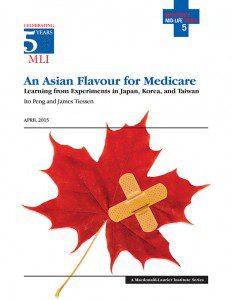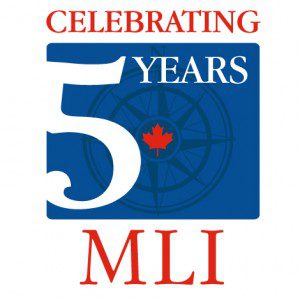New MLI study shows how Canada could learn from Japan, Korea and Taiwan as it seeks to reform its health-care system
OTTAWA, April 30, 2015 – For too long Canadians have assumed that reforming Canada’s health-care system will lead a system that’s almost identical to the United States’ poorly-performing model.
But there are lessons to be learned elsewhere.
A new paper for the Macdonald-Laurier Institute highlights how examining reforms in Asian countries could provide insights for improving Canada’s underperforming system.
Authors Ito Peng and James Tiessen show how reforms in Japan, Taiwan and Korea – including greater competition between hospitals, introducing user fees and putting hospital specialists on salary – have controlled health-care spending while still offering top-quality services.
Those countries have a lower infant mortality rate than Canada, better pharmaceutical coverage and the latest technologies for hospitals. All three have shown an eagerness to innovate that would put Canada to shame. All three have also had to address population aging and the need for long-term care insurance, which holds lessons for Canada.
“It is unfortunate that Canada is not more familiar with how health care is funded and delivered in Asia, particularly considering that Japan’s universal access system predates Canada’s by a decade”, the authors write.
To read the full report, titled “An Asian Flavour For Medicare: Learning from experiments in Japan, Korea and Taiwan”, click here.
That Canada will have to make changes to its system of delivering health-care services in the coming years is obvious.
Medical services are chewing up bigger and bigger portions of provincial budgets, crowding out spending in other important areas such as education and infrastructure. At the same time, an aging population threatens to further drive up costs in the years to come.
What’s less clear, though, is how to best reform the system. Many people feel that the U.S. model, which is expensive, complex and leaves much of the population without coverage, is the only alternative.
 But Peng and Tiessen show that Japan, Korea and Taiwan have also faced similar issues – and managed to come up with a plan for improvement.
But Peng and Tiessen show that Japan, Korea and Taiwan have also faced similar issues – and managed to come up with a plan for improvement.
“These countries are facing similar challenges to Canada in financing and delivering health care and long-term care to populations that are aging at a very rapid rate”, the authors write.
“Their best practices as well as their past and future challenges, thus offer important lessons for Canadian policy-makers”.
The authors find several lessons, including:
- Policy-makers must actively learn from abroad: Japan, Korea and Taiwan wasted little time in searching other jurisdictions for solutions.
- Identifying new health policy ideas isn’t enough: Entrenched interests are often the biggest barrier to change. Politicians in Asia were willing to make difficult but necessary decisions to rein in health-care costs, even if they are unpopular with some.
- User fees can improve equity and coverage: Japan, Korea and Taiwan have all employed user fees to raise funds and discourage frivolous use without reducing access to care.
- Competition among private hospitals can help improve quality of services: Japan, Korea and Taiwan have all introduced market processes that encourage providers to compete for patients.
- Hospital specialists on salary: Paying primary care physicians for each time they treat a patient (a “fee-for-service” model) incentivizes seeing more patients, but it also encourages delivering expensive services to those who may not need them. Japan, Korea and Taiwan have curbed this by putting some specialists on a salary.
- Long-term care insurance could help mitigate the effects of population aging: Canadian provinces should look at introducing a long-term care insurance program on a social-insurance model, funded by mandatory payments and government subsidies for those with low incomes, that would divert aging patients away from expensive hospital stays. Long-term care is not covered by the Canada Health Act, so there is room for provinces to experiment with sustainable funding models.
- Improve the use of information technology: Japan, Taiwan and Korea have all benefited from adopting digital records that have been shared between providers and funders.
Peng and Tiessen acknowledge that Canada is in many ways very different from these countries. But they say it would be foolish to let this stand in the way of learning what they have to offer.
“Limiting the scope of comparisons to the same familiar countries reduces the chance of finding fresh new ideas”, they write.
“An Asian Flavour for Medicare” follows MLI’s November 2013 examination of the Swiss, Swedish and British systems titled “A European Flavour for Medicare”.
***
Ito Peng is a Professor of Sociology and Public Policy at the Department of Sociology and the School of Public Policy and Governance, and the Director of the Centre for Global Social Policy at the University of Toronto.
James (Jim) H. Tiessen is Associate Professor and Director of the School of Health Services Management at the Ted Rogers School of Management, Ryerson University, in Toronto.
The Macdonald-Laurier Institute is the only non-partisan, independent national public policy think tank in Ottawa focusing on the full range of issues that fall under the jurisdiction of the federal government. Join us in 2015 as we celebrate our 5th anniversary.
For more information, please contact Mark Brownlee, communications manager, at 613-482-8327 x105 or email at mark.brownlee@macdonaldlaurier.ca.




